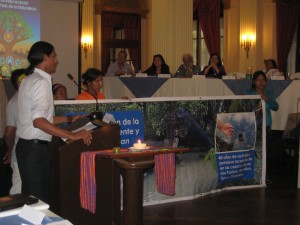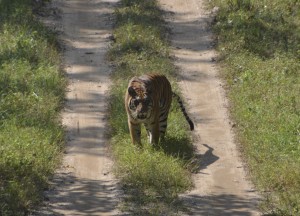Is Empathy For Nature Missing from the UN Climate Talks?
Dec 9th, 2014 | By admin | Category: Environment/SustainabilityBy Suzanne York, www.howmany.org
From the outside, it seems like the UN climate negotiations are all about wordsmithing, rehashing decades-old arguments on responsibility, finance and a little bit about impacts on people.
It is more difficult to hear about the planet, i.e., nature, in the talks. When it does come up, nature is often reduced to a commodity . The earth is enduring its sixth mass extinction. Do negotiators really care?
How Long Will We Have Wild Animals?Recent reports on decline in biodiversity – especially of beloved creatures – underscores the urgency of finding real solutions to climate change.
World Wildlife Fund’s Living Planet Report 2014 should have set off alarms with its finding that wildlife numbers have declined by 52 percent over the last 40 years.
Another report found that giraffes are on the decline and close to extinction – the population of African giraffes has decreased by 40 percent over the last 15 years. They are dramatically losing habitat. Soon, if you want to see the world’s tallest animal, you will only be able to do so at a zoo and not in the wild.
Globally, there are at most 3,000 Bengal tigers in the wild, and about half are found in India. A record number of tigers have died in India in the past four years – a total of 274 – according to government census. More than 70% of tiger deaths were due to poaching.
Elephants? Forget them too, victims of poaching of their ivory tusks to be made into luxury items. A study published in the Proceedings of the National Academy of Science found that since 2010, an average of nearly 35,000 African elephants have been killed annually.
Humans are altering the face and fate of the Earth. We all consume resources, and yes, some more than others, but whether human environmental footprints are big or small, there is still an impact on the environment. There are over 7 billion people today and likely to be 9 billion by 2050. How world governments can reduce carbon emissions in the face of increasing population is not being talked about much here in Lima.
“We are Destroying Ourselves”
One side event at the Lima UN climate conference focused on the rights of nature. It took place as a people’s tribunal, placing the global corporate economic system on trial, and put forth the view that nature is a rights-bearing entity and not a commodity. Cases were presented that ranged from fracking to oil drilling in the Amazon to destruction of the Great Barrier Reef.

Peruvian indigenous leader giving testimony at Rights of Nature tribunal in Lima [photo: Suzanne York]
Patricia Gualinga, a Kichwa indigenous woman from Ecuador, said that in regards to nature, our eyes are closed. We depend upon and are connected to species, she asked, but “who is talking on behalf of these creatures?” In her passionate presentation, Gualinga pleaded that we have gone beyond the limits of what is allowed. “We are like kids,” she said, and we don’t understand that we “are destroying ourselves.”
The eyes of developed countries are closed, and many developing countries are joining the ranks as they pursue economic growth. They all chase the growth mentality at any cost, where it is not too high of a price to pay to destroy the Amazon for oil, indigenous lands in Canada for tar sands, rural communities in Peru for gold, silver and copper.
The UN is not listening to this because for now it is part of the problem. While it certainly does important work, at the same time it also promotes false solutions such as carbon markets and carbon offsets as the path to a better world. These are not solutions for indigenous peoples or nature, nor for industrialized society. We forget or ignore that we are part of the ecosystem and web of life at our own peril.
Recognizing Our Sacred World
Casey Camp-Horinek, an indigenous woman leader from the Ponca Nation in Oklahoma, said at the rights of nature tribunal that “Mother Earth is a living organism as truly as we are.” She spoke of how we need to set our human egos aside and “recognize the sacred relationship” we have with the biosphere of earth.
UN negotiators, governments, many NGOs, and people need to hear this to bring about real change to cope with climate impacts. In the words of Camp Horinek, “We all have to be aware, and the time is now for us to make the difference.”
Suzanne York is a senior writer with the Institute for Population Studies and is in Lima, Peru for the UN global climate talks.

